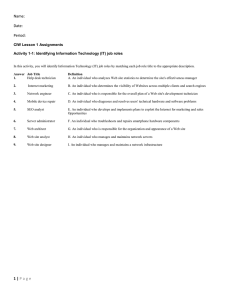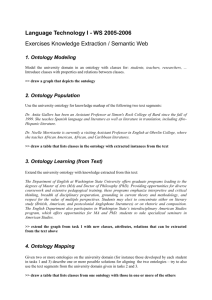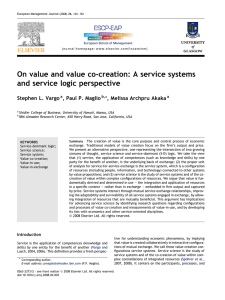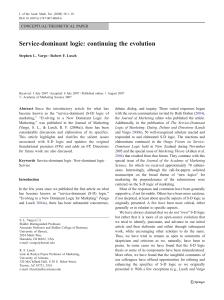Revisiting technology thinking in service innovations and
advertisement
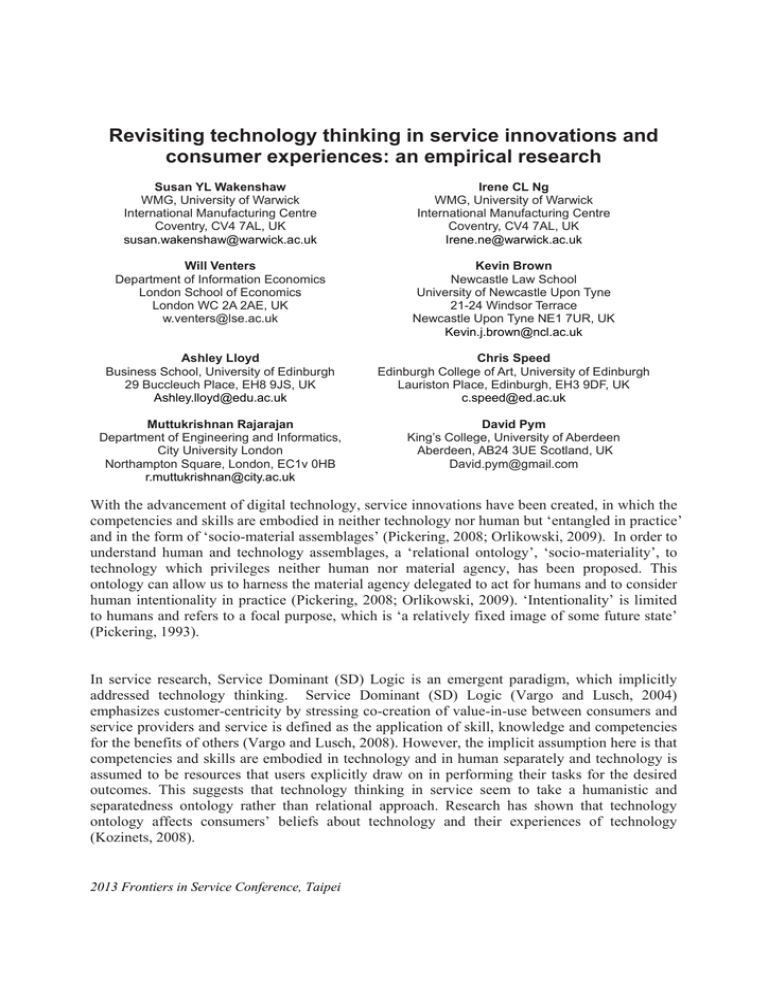
Revisiting technology thinking in service innovations and consumer experiences: an empirical research Susan YL Wakenshaw WMG, University of Warwick International Manufacturing Centre Coventry, CV4 7AL, UK susan.wakenshaw@warwick.ac.uk Irene CL Ng WMG, University of Warwick International Manufacturing Centre Coventry, CV4 7AL, UK Irene.ne@warwick.ac.uk Will Venters Department of Information Economics London School of Economics London WC 2A 2AE, UK w.venters@lse.ac.uk Kevin Brown Newcastle Law School University of Newcastle Upon Tyne 21-24 Windsor Terrace Newcastle Upon Tyne NE1 7UR, UK Kevin.j.brown@ncl.ac.uk Ashley Lloyd Business School, University of Edinburgh 29 Buccleuch Place, EH8 9JS, UK Ashley.lloyd@edu.ac.uk Chris Speed Edinburgh College of Art, University of Edinburgh Lauriston Place, Edinburgh, EH3 9DF, UK c.speed@ed.ac.uk Muttukrishnan Rajarajan Department of Engineering and Informatics, City University London Northampton Square, London, EC1v 0HB r.muttukrishnan@city.ac.uk David Pym King’s College, University of Aberdeen Aberdeen, AB24 3UE Scotland, UK David.pym@gmail.com With the advancement of digital technology, service innovations have been created, in which the competencies and skills are embodied in neither technology nor human but ‘entangled in practice’ and in the form of ‘socio-material assemblages’ (Pickering, 2008; Orlikowski, 2009). In order to understand human and technology assemblages, a ‘relational ontology’, ‘socio-materiality’, to technology which privileges neither human nor material agency, has been proposed. This ontology can allow us to harness the material agency delegated to act for humans and to consider human intentionality in practice (Pickering, 2008; Orlikowski, 2009). ‘Intentionality’ is limited to humans and refers to a focal purpose, which is ‘a relatively fixed image of some future state’ (Pickering, 1993). In service research, Service Dominant (SD) Logic is an emergent paradigm, which implicitly addressed technology thinking. Service Dominant (SD) Logic (Vargo and Lusch, 2004) emphasizes customer-centricity by stressing co-creation of value-in-use between consumers and service providers and service is defined as the application of skill, knowledge and competencies for the benefits of others (Vargo and Lusch, 2008). However, the implicit assumption here is that competencies and skills are embodied in technology and in human separately and technology is assumed to be resources that users explicitly draw on in performing their tasks for the desired outcomes. This suggests that technology thinking in service seem to take a humanistic and separatedness ontology rather than relational approach. Research has shown that technology ontology affects consumers’ beliefs about technology and their experiences of technology (Kozinets, 2008). 2013 Frontiers in Service Conference, Taipei We empirically contribute to technology thinking in service by extending research into technology ontology through gaining insights into consumers’ beliefs about and experiences of various types of digital technology innovations in their lived lives. Here, we define technology ontology as the understanding of what technology is and the relationships between human and technology. A mix methods methodology was employed including self-reflective reports, interviews and visual artistic method. The findings reveal the existence of separateness and relational ontology for technology-enabled services and the salience of technology ontology depends on consumer’s beliefs about technology and technology features. These ontological approaches can affect consumer beliefs about, and experiences of, technology-enabled services. Contrary to the conventional wisdom that focuses on technology as separated entity, this research encourages service providers to emphasize the entanglement of technology with consumer routine practices, which can enhance consumer experiences in their encountering with technology-enabled services. Our work contributes to (1) technology thinking in service research (2) consumer beliefs and experiences with technology-enabled services (3) service innovations. References Kozinets, R.V. (2008) Technology/ideology: How Ideology Fields Influence Consumers’ Technology Narratives, Journal of Consumer Research, 34, April, pp.865-881 Pickering, A. (1993) The Mangle of Practice: Agency and emergence in the sociology of science, American Journal of Sociology, 99(3), pp.559-589 Pickering, A. (2008) New Ontologies in Mangling in Practices, A.Pickering (ed.). Duke University Press, pp.1-14 Orlikowski, W.J. (2009) The Sociomateriality of Organizational Life: Considering Technology in Management Research, Cambridge Journal of Economics, 34, pp.125-141 Vargo, S.L. and Lusch, R.F. (2004) Evolving a New Dominant Logic for Marketing, Journal of Marketing, 68, January, pp.1-17 Vargo, S.L. and Lusch, R. F. (2008) Service-Dominant Logic: Continuing the Evolution, Journal of the Academy Marketing Science, 36, pp.1-10 2013 Frontiers in Service Conference, Taipei


